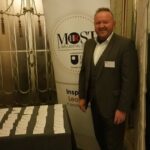I bet none of us predicted what 2020 really would involve! In looking back at my 2020 predictions I said it would be about graft, autonomy and energy. Upon reflection, I think we’ve all had to work really hard, in ways that required a lot more self-direction than we expected and our energy was severely challenged by being ill, in isolation and dealing with injustice in the world.
I am predicting the gradual transition from HR business partners to enterprise partners (people).
All through the pandemic, we’ve seen polarising arguments about the need for an office, the rise of appreciation of key workers, the shocks and losses of long-term brand giants and the challenges of ‘Zoom fatigue’. So what does 2021 have in store for the HR profession and the world of work? In the year ahead we’re anticipating a potentially vaccinated population plus the inevitable financial instability that comes as a result of the severely restricted state of operating this past ten months or so. Here are my three predictions.
1. Agility becomes the norm – finally
Forced into the action of a more unorthodox nature in response to the pandemic, businesses and people have adapted in the most rapid transition we’ve seen in work in a long time. I’ve been exploring ‘agile’ and self-managed systems of work for over a decade. I’ve come to love it and am biased towards it for a range of reasons. Not just because I declare myself as anti-hierarchical, but because it works.
The pandemic response was a shared experience by all businesses, which made it even more acutely obvious what was happening as a result of dispersed home-based working for around 49% of the working population (in desk-based jobs). We were all discovering how we get work done, connect with others, strategise, plan, do, learn and share. I call this the ‘knowing’ of the work itself, not just having skills or experience of a desired outcome.
When I talk about ‘agile’, I’m referring to the approach to projects in sprints with specific iterative stages of development. Here, the knowing of the work is a key feature of its success in digital technology organisations. We need to know:
- What do we need to do – by setting it out in a vision or product story
- Who we need to do it – by forming an agile team, squad or scrum
- When we need to do it by – by creating a high-level roadmap of the stages of development to the final product
- How we do it
- By assembling stories about the people we’re doing the work for and the tasks needed in those iterative sprints.
- By using real-time planning and adjustments, retrospective reviews, minimal bureaucracy and reporting.
- By embracing pacy and creative demonstrations of progress, and most importantly, inclusive and open ways to involve people who may not normally be ‘selected’ to join a team of this nature.
For clarity, there’s agility – being responsive, flexible and adaptable in changing circumstances – and then there’s agile. A ‘methodology’, an approach to projects using defined, but very adaptable rituals, ceremonies, roles and processes.
While it’s important we acknowledge the agile mindset and embrace more fluidity, I also think it’s important for HR to learn, adapt and then adopt more of the hallmarks of agile. Working this way requires a shift in language and approach and as such, we are more cognitively aware we’re working differently. We can override our mental shortcuts that we’ve formed and create new habits and new shortcuts that aren’t simply the repetition of things that may no longer work.
So if HR can build on this newfound driver and adopt more Agile approaches like working in sprints, cutting bureaucracy and sharpening the focus on iterative, inclusive and pacy production of new policies, guidance, learning programmes, hiring techniques and more I think our business enterprise colleagues will thank us.
I sense many of us have been ‘peering around the corner’ at how technologists and product managers work this way. It’s my prediction that HR will ‘turn this corner’ else be even more overstacked and breathless in trying to keep up with the changes.
2. There is no top table – only mission control
While we’re now used to crisis responses at times of chaos, we’re now heading into the complexity of not knowing the best responses to a post-pandemic world. We’ve experienced so many different things, and we all feel different about how life and work could be. So we can abandon the seat, and do stand-ups around the schemas and roadmaps for our reactive and preemptive strategies that are more quarterly plans and not five-year pipe dreams.
This isn’t short-termism on steroids, it’s sensible planning for a vision ahead, in smaller, more manageable chunks of experimentation.
Studies into this experimentation show – as Marcus Buckingham and Ashley Goodall’s book Nine Lies About Work outlined – it’s not the best plan that wins. It’s the best intelligence that wins. HR’s role as people intelligence purveyors is ever more crucial. So experiment, assess, analyse, deduct, proclaim, produce and replicate the best of what an intelligent approach to people and work is needed. Which leads me to my third prediction.
[cm_form form_id=’cm_65a14c3f5da64′]
3. HR roles are revamped and reinvented
With a potentially much-needed reset on work and life, we shouldn’t return, we should reinvent. In HR I see us take on and learn more about the sciences of human behaviour, team dynamics and the impact on emotional states of continued flexible ways of working with less fiscal fuel in the tank.
So we will become more like data analysts, systems thinkers and product managers than HR advisors or trainers. These new roles will guide HR into the real evidence-led, people-centric ways that help us solve the productivity flatlining puzzle and cope with the inevitable financial constraints that lie ahead.
I am predicting the gradual transition from HR business partners to enterprise partners (people) who will be the intelligence and relationships source of how businesses make the most of their people. We’ll see these enterprise partners incorporated into networked teams that are designing the adapted solutions we need to keep the wheels of work turning in the bumpiest of roads ahead.
This time next year, a reinvented HR at the heart of an agile, intelligence-led mission control is how I hope to look back on 2021.
Interested in this topic? Read How can HR learn to live with Covid-19 and plan for more uncertainty in 2021?






